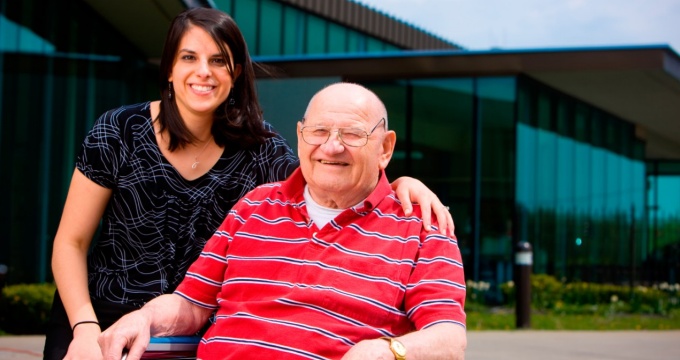Excellence in Aging Graduate Micro-Credential

Develop the skills you need to improve the care and well-being of older adults, their families and caregivers.
The Excellence in Aging micro-credential consists of two courses and a non-credit seminar series that prepare current and future professionals to successfully work with and on behalf of the older population.
Gain a well-rounded, holistic experience in the field of aging through exposure to multiple topics and a range of content areas. This program will help to strengthen and increase the availability of providers, and enhance direct practice and leadership skills in gerontology.
On this page:
Program Overview
These courses are open to graduate students from any major.
You can complete this program fully online or as a hybrid. Upon completion of the courses, seminars and reflection paper, you will earn a micro-credential on your academic transcript, as well as a digital badge you can showcase on your digital résumé, social media profiles or e-portfolio.
SW 706 The Aging Population and Their Families (3 credits)
This course focuses on problems and issues that most directly affect older persons and their families. Guided by current theories of aging and human development in later life, the course addresses the unique health, mental health and social service needs of older adults. The course discusses how federal and state policies, such as Social Security, Medicare and Medicaid, direct the development of home- and community-based care, long-term care, the relationship between informal and formal caregiving, and how they influence the lived experiences of older people and their families. Course sessions will examine the unique needs, issues and concerns of diverse older populations, and introduce assessment tools and evidence-based interventions for older adults in a variety of practice settings. This course incorporates a trauma-informed and human rights perspective to social work practice with older adults and their families.
SW 721 Social Policy and Programs for the Aging Population (3 credits)
This course familiarizes students with social policies, programs and services to meet the rapidly growing needs of the older population, with an emphasis on diversity and human rights. This course will increase students' awareness and knowledge of programs and services provided through the Older Americans Act, the Social Security Act (including Medicare and Medicaid), Affordable Care Act and other policies and community initiatives for the aging population. It focuses on the history, features, strengths and limitations of these existing policies, and provides the skills needed to advocate for change at the legislative, agency and community levels. Students will be exposed to content that will enable them to understand aging programs in social services, health care, housing and other elements of community and institutional long-term care systems. This course incorporates a trauma-informed and human rights perspective when considering policies that target the older adult population.
Presented by local, regional and national experts, the seminars cover a range of aging-related topics. Attendance (in person or online) is required to complete the micro-credential.
After completing the two-course sequence and seminar series, you should submit (electronically) to the director a 3-to-5-page reflection paper (double spaced in APA 6th edition formatting) that addresses the following components:
- What have you learned through the series of courses and the seminars? Did the content meet your expectations? Why or why not?
- What do you view as the primary needs to the aging population? Has your perception of these needs changed as the result of participation in this program? Why or why not?
- How were the courses and seminars related to one another and/or your current internship and/or employment?
- How has the content provided through the coursework and seminars prepared you to work with and on behalf of the aging population? If you are currently employed in the field of aging, how has content impacted your current work?
- How do you foresee using the knowledge and skills you developed through this program in the future?
Receive New York Contact Hours for SW 706 and SW 721
SW 706 and SW 721 courses are approved for NYSED social work contact hours to renew your license registration. If you have a license in another state, check with your state regulatory board to determine if New York hours will be accepted in your state.
Use this form upon completion of a course to request a NYSED social work contact hours certificate.
Smaller that a minor, certificate or degree program, micro-credentials allow you to meet your personalized learning needs by gaining knowledge and skills in areas that are relevant to your academic or professional goals. Micro-credentials equip you with digital badges that showcase your achievements and all it took to get there.
When you complete a micro-credential program you will earn a digital badge or a series of digital badges. A digital badge is a clickable icon that houses important information, including the issuing institution, the date earned, the criteria required to earn the badge and evidence showing you have met that criteria.
Digital badges are dynamic credentials that you own, so you can decide how you wish to use them. You can add them to your social media profiles, digital résumé, e-portfolio and more.
UB digital badges are issued through Acclaim, allowing you to display your skills and accomplishments for employers, colleagues and peers. For questions about using Acclaim, contact the Office of Micro-Credentials at micro@buffalo.edu or 716-645-1357.
Contact

Louanne Bakk
DSW Program Director and Clinical Associate Professor
Email: louanneb@buffalo.edu
Phone: 716-645-1861